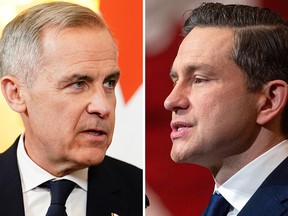In both B.C. and Ontario, the Carney Liberals hold a 10-point lead over the Conservatives.

Article content
OTTAWA — A new poll suggests the Liberals are widening the gap in three key provinces, all expected battlegrounds to form the next federal government.
A Leger/Postmedia poll, released Wednesday, suggests that nationwide the Liberals sit at 44 per cent and the Conservatives at 38 per cent in support, a gap of six points and consistent with the previous week’s numbers.
Advertisement 2
Article content
But more in-depth research in Ontario, Quebec and B.C. suggests the Liberals’ lead on the Conservatives is growing in those three provinces.
In B.C. and Ontario, Mark Carney’s Liberals hold a 10-point lead over Pierre Poilievre’s Conservatives. That’s despite support for Poilievre’s troops now being higher in both B.C. and Ontario than it was in either the 2019 and 2021 federal elections.
“Certainly, for the Conservatives, B.C. and Ontario are critical, critical battlegrounds for them, and being 10 points behind the Liberals is not good news,” said Leger executive vice-president Andrew Enns.
Part of the reason, Enns says, is the Liberals are reaching support levels in all three provinces that are higher than anything seen during Justin Trudeau’s tenure since 2015.
In B.C., the Liberals are polling at 48 per cent, whereas in Ontario their support is at 49 per cent. The last time the party won a majority government, in 2015, it garnered 35.2 per cent and 44.8 per cent of the vote in those provinces, respectively.
Three months ago, on the eve of Justin Trudeau’s resignation as party leader, the Liberals trailed the Conservatives by roughly 20 points in Ontario.
Article content
Advertisement 3
Article content
Enns says the Greater Toronto Area (GTA) and B.C.’s lower mainland tend to be must-win areas for the Conservatives to form government. But nearly two weeks into the election campaign, Poilievre’s team trails the Liberals by five and 15 points in those regions, respectively.
“Those are really crucial areas for Conservatives to make inroads if they’re going to get that majority. And you know, at this stage of the game, I’m sure they’re happy people aren’t voting today,” he noted.
Some Tories, however, are dubious of the polling trend that has appeared to show them falling behind.
In an interview with National Post this week, one Conservative GTA riding candidate said what he’s hearing while knocking on doors is that his party’s message on cost of living is resonating.
“This is the first election in my lifetime where there’s a disconnect” between the polls and the doorstep, said five-time Tory candidate Costas Menegakis, who sat in Parliament during former prime minsiter Stephen Harper’s majority.
It’s not the Conservative vote that is collapsing in those areas, Enns says, though it has certainly decreased since the party’s polling high at the peak of Trudeau’s unpopularity in December 2024.
Advertisement 4
Article content
The biggest issue for Conservatives is the collapse of the NDP’s support both nationally and in those provinces, largely to the benefit of the Liberals.
Both nationally and in B.C., Ontario and Quebec, NDP support sits somewhere between five and eight per cent.
“The Conservatives need to be somewhere in the high 30s or low 40s. That’s a good number for them and they can win a lot of seats,” Enns said.
“However, … going back to 2011 when Stephen Harper swept the (Great Toronto Area), the other factor that contributed to that really good night for the conservatives was an NDP vote in Ontario (that was) up around 20 per cent to 22 per cent.”
The NDP is polling so low that were the vote today, leader Jagmeet Singh would be unlikely to win his newly redistributed riding of Burnaby Central in B.C., Enns noted.
In Quebec, generally a must-win province for the Liberals if they hope to form government, Carney’s troops hold a 20-point lead over both the Tories and the Bloc Québécois (both sitting at 23 per cent).
“It’s been a long time since the Liberals have enjoyed a sizable lead like they currently have in Quebec,” Enns said.
Advertisement 5
Article content
If the vote were today, the combination of Quebec, B.C. and Ontario polls suggest the Liberals would win a “pretty sizable majority,” he added.
Enns also cautioned that it’s still early in the campaign and anything can happen. For example, the French-language debate, set for April 16, can be a key moment in a campaign, notably leading to a major boost for Bloc Québécois leader Yves-François Blanchet during the 2019 and 2021 federal elections.
“I would not discount the ability for things to change in Quebec. The debates will be important,” Enns said. “It will be an interesting opportunity, certainly for Mr. Blanchet and even Mr. Poilievre to try to make up some ground.”
The Leger poll was conducted between March 26 and 30 with a sample of 1,000 Ontarians, 501 British Columbians, and 871 Quebecers via an online panel. While margins of error can’t be applied to this type of survey, a probability sample of this size would be plus or minus 2.6 per cent for the Ontario sample, and plus or minus 4.38 per cent for the B.C. sample, 19 times out of 20. The polling firm did not provide an estimated margin for comparison purposes for the Quebec data.
Readers can see the full poll on the Leger website.
National Post
Get more deep-dive National Post political coverage and analysis in your inbox with the Political Hack newsletter, where Ottawa bureau chief Stuart Thomson and political analyst Tasha Kheiriddin get at what’s really going on behind the scenes on Parliament Hill every Wednesday and Friday, exclusively for subscribers. Sign up here.
Article content
